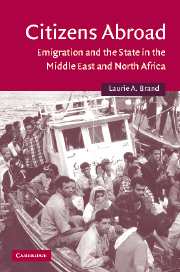Book contents
- Frontmatter
- Contents
- List of tables
- Preface
- List of acronyms
- 1 States and their citizens abroad
- 2 State sovereignty, state resilience
- 3 Morocco: expatriates as subjects or citizens?
- 4 Tunisia's expatriates: an integral part of the national community?
- 5 Lebanon and its expatriates: a bird with two wings
- 6 Jordan: unwilling citizens, problematic expatriates
- Conclusions: transnationalism, security and sovereignty
- Bibliography
- Index
- Cambridge Middle East Studies 23
2 - State sovereignty, state resilience
Published online by Cambridge University Press: 22 September 2009
- Frontmatter
- Contents
- List of tables
- Preface
- List of acronyms
- 1 States and their citizens abroad
- 2 State sovereignty, state resilience
- 3 Morocco: expatriates as subjects or citizens?
- 4 Tunisia's expatriates: an integral part of the national community?
- 5 Lebanon and its expatriates: a bird with two wings
- 6 Jordan: unwilling citizens, problematic expatriates
- Conclusions: transnationalism, security and sovereignty
- Bibliography
- Index
- Cambridge Middle East Studies 23
Summary
The now voluminous literatures on globalization and the new security agenda intersect in their discussion of whether the state is waning in importance or manifesting forms of resistance in the face of contemporary challenges. There is no question that many issues formerly understood as being under the control of the state or falling within its sovereign realm can no longer be accurately portrayed in such a way. Environmental threats in the oceans and the air admit no boundaries; developments in military technology have rendered national boundaries vulnerable in an unprecedented way; economic restructuring in response to neoliberal dictates has reconfigured the role of the state in the domestic economy and opened the way to broader and deeper foreign investment that is less controlled by national authorities; and the speed and development of communications have rendered virtually impossible tight governmental control of information flows across borders. In the realm of population movement, the evolution of the global economy has led employers to seek low-cost (often illegal) labor, thus rendering increasingly difficult the prevention of undocumented flows. Moreover, despite state efforts to stem the tide, the numbers of refugees, displaced and asylum seekers have been steadily rising.
In addition, some argue that state power is waning owing to the growth in numbers and importance of a variety of transnational actors – some of them of a supranational sort, others sub-national in origin – which engage in coordination and advocacy work on such issues as human rights, the environment, indigenous culture and women's rights, supported by like-minded activist groups abroad.
- Type
- Chapter
- Information
- Citizens AbroadEmigration and the State in the Middle East and North Africa, pp. 24 - 44Publisher: Cambridge University PressPrint publication year: 2006

